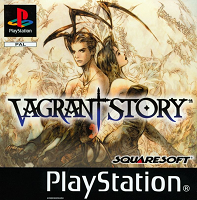
An atmospheric masterpiece that perhaps more than any other demonstrates Squaresoft's mastery over the Playstation, Vagrant Story is an action RPG presenting a dead magical city to explore and a cinematically unfolding storyline done entirely in-engine that looks absolutely stunning.
The son of a duke is taken for ransom by a terrorist cult that retreats to the abandoned magic city of Leá Monde after making their demands and so Riskbreaker Ashley Riot is sent in to solve the situation. Things go awry as terrorist leader Sydney Losstarot turns out to be somehow immortal, and Ashley takes pursuit while the Church and other Riskbreakers also vie into the city for their own agendas...of the Ivalice games with their unmistakable mix of political machinations and dark magicks, Vagrant Story's tightly defined scope and strong character work make it the most intriguing and complete plot. Ashley's cool and collected one man army demeanor ("I am the reinforcements", he famously utters in the extended intro that plays on the title screen) is brilliantly juxtaposed by Sydney's tempting and taunts, as he seemingly wants to break down Ashley's very persona for reasons of his own.
In traditional Ivalice fashion revelatory cutscenes and lonely undercity delving alike are accompanied by Hitoshi Sakimoto's mood-crafting soundtrack. From wine cellars and catacombs to mines and temples, Leá Monde's underbelly is full of personality and danger. The unique and obtuse combat system makes the frequent boss fights seem daunting, but coming to grips with how to push damage through and not die is quite satisfying, and finding the occasional breakroom where you are able to fashion better equipment from the pile of metal you're carrying while safe from any harm is soothing. All in all Vagrant Story does not overstay its welcome as you'll likely solve Leá Monde's mysteries in well under 20 hours, and it is a gripping experience the entire way through.
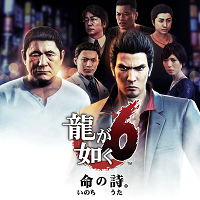
Ostensibly a bunch of crime drama brawler adventures, it's everyone's favorite variety meme game series entry. As the case tends to be, Kazuma Kiryu swears that this time he's out of the game for sure but life finds a way and so there's another inevitably stupid conspiracy to cover and many faces to punch until the problem is solved. The many and lengthy cutscenes the plot takes place in in these games are always fun to watch unfold as the characters carry themselves with an undeniable swagger until it all inevitably breaks down into slightly janky, but visceral fights. The finales of these games are always highly satisfying, and as the last game with Kiryu in the spotlight this one brings a suitable bow to it all.
Aside from all that though, the Yakuza series prides itself in detailing its serial numbers filed off cityscapes with stunning, inviting accuracy. There are always ton of very involved side activities to partake in, because what self respecting crime lord wouldn't want to sink hours into learning Shogi, gambling in Mahjong tournaments or racing slot cars? Just running around town and taking in the sights will undoubtedly have the player bumping into various people with their own strange side stories too, which is where most of the series's comedic side comes from. The material has a pretty good hit rate too, owing to the dynamic of stoic but awkward Kiryu as great straight man for all the massive personalities you meet, and so discovering these side stories feels rewarding. These are hefty games too. There's 7 of these things just in Kiryu's story and they're all ginormous. There is always more in the streets of Kamurocho...
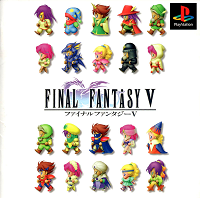
Square's classic adventure world(s) RPG. People dumped a bunch of evil into a tree and then sealed it calling it job well done and it turns out that was a really terrible idea! Get a-questin' on the path to lumberjackin'. The main feature here is the job system that allows any of your four characters to do anything they want and then even cross-class abilities for some benefits. The jobs have invidual detailed sprites for each character and how their power ebbs and flows as you face different types of threats and gain new gear and skills is a lot of fun.
It's not perfect, as honestly half of the jobs belong in a trashcan on an optimal playthrough...but it does rouse the imagination and very naturally lead you to play with a bunch of different toys. The plot is basic but functional (with a fun jazzed up script in the GBA version) and the scenario rapidly moves along, making this a very playable and replayable one. The worlds have a bunch of side curiosities and secrets to them too for the avid explorer, and the visual style and music are quite memorable. Good clean fun.
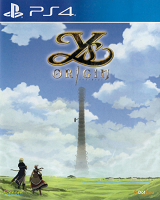
In many ways the ultimate action RPG, with emphasis on action. Take up your axe, magic eye bullets or claws and slash everything in your way up the 25 floor tower of Darm, encountering different zones, light puzzles, and most importantly massive bosses on the way. The action is perfectly responsive and set to one of the most rockin' soundtrack in videogames, and the pace of the gameplay is perfect, with a playthrough clocking in at around 6 hours. There are notable differences between the characters that make you approach foes differently with the axe-toting Yunica than the magician Hugo or the claw-wielding dashing stranger. Bosses get slightly shuffled around depending on your main character too (with some special surprises...) and the story focuses on somewhat different things so playing as each character feels fresh. If that's not enough, there's also a pile of difficulty settings, an arena mode with a special superboss, alternate moveset versions of each character you can take into the main game, and even Adol with Oath in Felghana and Napisthim versions makes an appearance.
Speaking of which, Oath and Napisthim are also games in a very similar vein that similarly kick a lot of ass. I prefer Origin because of the character choices and a linear scenario that is better tuned, but especially Oath is also worth checking out for some excellent action. The newer, party-based Ys games hit a bit different due to the additional time spent in menus and futzing around with skills and item drops and party members, so the trilogy of full action single character Ys games is the closest to my heart. The greatest, most high octane blademastery around.

A beautiful, contemplative, romantic visual novel. Serious Sachiko and bubbly Takako are a couple, living an ordinary, enjoyable life, complementing each other, getting to spend all their days together whether it is working at Sachiko's visual design company or at home - or so it appears to Sachiko until a chat with a coworker makes her realize Takako is actually long gone. Cue the first chapter, with Takako as a patient in a sanatorium struggling with memory loss. That is the opening SeaBed presents to us, and it continues to alternate between perspectives of Sachiko, who confides in longtime friend, therapist by trade Narasaki and decides to take time off from work and go to an idyllic vacation inn to process the mental load that caused her to hallucinate, and Takako, who is getting used to her new life with the other inhabitants of the sanatorium while still attempting to grasp the memories that elude her.
The style of the work belies the term visual novel - SeaBed is written in the style of a work of literature and accompanied with jazzy/ambient background music and a limited amount of visuals. It is not filled with hijinks or plots either, as the main characters are written as very realistic adults. That is not to say it is humorless, as the wry wordplay in character interactions will attest to. Scenes flashing back to Takako and Sachiko's past together, whether it be moments of childhood or them indulging in their shared love of travel as adults, are a particular highlight to read through and brimming with warmth. Within the dense and elaborately paced text of SeaBed unfolds a truly brilliant and rather unique story of love, loss and coping. The very last line of the story will certainly stick with me through life like few other passages possibly could.

Atelier Rorona, Totori, and Meruru - a trio of tremendous adventure alchemy games and the series's return to roots after experimenting with more traditional JRPG trappings on the PS2. It is a sequential trilogy with many of the same characters popping up in future games and much of the basic game flow is shared between titles: Gather ingredients, battle monsters in a time card system, synthesize items, explore to get to new areas, upgrade your equipment, buy recipe books, see friend events, set up items for wholesale all while time is gently passing. So let's talk a little about the differences in scenario and feel.
Atelier Rorona is the first one and takes place in the royal capital of Arland, where Rorona inherits her capricious teacher's atelier and a notice that it is facing demolishing. As such it is up to you to prove the worth of the workshop to the kingdom and townspeople through quarterly royal assignments. These are pretty leisurely and you'll be able to devote plenty of time to alchemy studies, making friends and exploration as well. At the end of three years you'll get an ending largely based on what sort of things you have chosen to focus on, and there is an additional overtime year scenario that is intended to be played after you have experienced the entire trilogy. It is a very chill and warmhearted game with many comedic moments to it, and mostly lax and easy but with some satisfying challenge in the higher level areas and especially in the overtime scenario.
Atelier Totori, the sequel, has you take the role of Totooria Helmold whose goal is to become an adventurer in order to search for her missing adventurer mother. So she ventures from her small fishing town to Arland in order to get a license, and discovers the responsibilities of a licensed adventurer are many indeed. You need to take on various tasks all over the continent in order to increase your rank and range of operations, and eventually will seek to build a ship capable of sea travel and voyage to less known lands. There is a great sense of adventure to this game, and a lot of gameplay considerations come from how to plan your trips when going outside one of your two home bases.
These are taxing both in terms of travel days and your party's resources, and this is one of the more difficult Atelier games to see and do everything you desire in. There is a certain rush to making judgement calls about whether you should stretch out an expedition or cut your losses and return home that is shared between this game and Meruru. The comedic elements and enjoyable characters are in this game too, but it also takes on more somber aspects as you travel through ruins and unknown lands in order to find any sign of your mother. All the games have an outright incredible soundtrack but a special mention has to go to how Totori's use of its leitmotif and other pieces evokes emotions.
Atelier Meruru is the last game in the trilogy and takes place in the small kingdom of Arls that has fallen on some hard times, so what could reinvigorate the nation? It's alchemy, of course. With aid from her alchemy teacher Totori, friends and palace staff, crown princess Meruru takes on the task of rebuilding the kingdom. There is a very satisfying progression to this one as you get royal decree points from successfully completing tasks, and with those points you get to start your pick of various contruction projects that offer you all kinds of bonuses, and the populace of the kingdom will also grow like an RPG/light civilization game hybrid.
A notable amount of the previous two games' casts return in this game in addition to some new faces, and there is again a more comedic bent to the proceedings as these massive personalities bounce off each other. The game has a very fun and uplifting energy to it that appropriately makes way for more ethereal and mysterious tracks as you explore the far reaches of the kingdom. Being the last game in the trilogy, it also offers the most complex alchemy and combat challenges, as well as plenty of time to really sink your teeth into those. It also features the most banging battle tracks in the trilogy to suitably accompany the highly fun fights.
That's the Atelier Arland trilogy! Full of joy, excitement and emotion, and now available in ultimate polished form. Truly brilliant concepts for games executed marvelously. Gust is a gift.
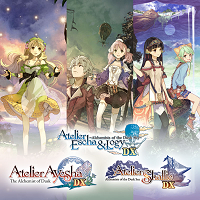
The Dusk trilogy of Ateliers Ayesha, Escha & Logy and Shallie was the next one in line after the Arland series. Instead of a mechanical throughline, this trilogy has a thematic one - it all takes place in the age of Dusk, a slowly creeping climate catastrophe that is drying out the world. The locations are portrayed in more muted (though stunningly beautiful) tones and cartoony fan favorite creatures such as the Puni are absent. The feel is more somber, but not gloomy - it's all about strong connections between people and doing the best you can.
Atelier Ayesha kicks off the trilogy and follows Ayesha, a rural apothecary, on her journey to try and find the whereabouts of her sister who was spirited away in a flower field. You go about finding clues, encountering people, and committing the events to memory in your journal, and inevitably get caught up in the intricacies of what and why is Dusk. It is a heartful story featuring breathtaking locations and a striking soundtrack. The combat system is rather basic and janky in comparison to other Atelier titles and doesn't really offer much in the way of appropriate challenge, so Atelier Ayesha is carried by its strong scenario.
Atelier Eschatology takes place in the frontier village of Colseit, where hometown alchemist Escha and capital government official Logy are dispatched to maintain and develop the settlement. You get to choose which main character's story you wish to follow, with the difference being from whose perspective you will see various character events. The game flow is more task-based, a bit in the style of a fusion of Rorona and Meruru, as you get quarterly assignments and upon reaching certain milestones can develop perks in the way you want.
The alchemy and combat systems of the game are top notch and a lot of fun to play with, both in terms of puzzling out how to find and create strong items and taking on numerous bosses through the field actions system. Eschatology also introduces the alchemy equipment system that has been a staple of the series ever since, where you designate a set of items you take to your excursions and those are refilled when you return, at minor monetary cost. Pacing of the scenario grinds to a halt in the middle, but the very endgame where you reach the floating ruins and uncover what was left behind is to date the strongest and most thematically punchy offer in the Atelier series.
Atelier Shallie caps off the trilogy, focusing on two girls named Shallie. Shallistera arrives in former coastal city, now oasis town Stellard in order to find a way to solve her village's drought problem and meets energetic Shallotte, who is trying to find her place in life. You can again choose between main characters and this actually leads to minor route splits and gameplay differences this time. Eventually all the key characters from previous games also converge in Stellard for one reason or another and at the end of the journey are answers about Dusk.
Gameplaywise Shallie does away with the loose time limits of the other Dusk series games and the progression is entirely based on plot, as well as the life tasks you are able to pursue between chapters. Combat has suddenly transformed into Mana Khemia 3, as the burst gauge and support system will be very familiar to fans of that subseries. It leads to some pretty exciting fights. Sadly alchemy is the game's weakest point, with a fundamentally unsatisfying system further undermined by abilities given out piecemeal. The game's other strengths are enough to make up for it though and it is a worthy ending to a great trilogy.
While the experimental formats of the games aren't perfect, Atelier Dusk trilogy are outstanding RPGs from start to finish, with a completely unique mood and feel to the experience.
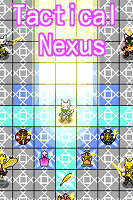
Tactical Nexus is a puzzle game wearing the skin of an RPG, a genre that follows the footsteps of cult classic Tower of the Sorcerer. You play as a wolflike character with HP/ATK/DEF stats and your goal is to reach a goal tile in a tower and obtain amounts of score that are enough to get a medal - with enemies and locked doors among other things blocking your progress in the tower, and stat ups/keys/etc. to give you a leg up. Some of the more important pickups even increase the percentage of HP or EXP you gain, and planning around these drastically alters how to approach the run. You (usually, depending on the rules of the tower) gain experience and dropped items based on the enemy's type with each one you defeat, and at levelup you can choose a bonus from either HP, ATK/DEF, or perhaps keys.
The gameplay is fully turnbased with your character as the only moving element, tower layouts are fixed and combat is entirely deterministic, so it's an optimization puzzle where you try to figure out how to maximize your progress while minimizing bleeding. Should you become strong enough to reach a goal tile you are scored based on your HP, ATK and DEF, with multipliers if you reach a further goal. It is a very engaging formula if you like this sort of math thing, and the tower designs are sublime in changing how you should evaluate stats, powerups and enemies based on the layout and rules. Perhaps most importantly to this sort of game the UI is very responsive and comprehensive, with damage projections, needed ATK to reach next turn breakpoint and other such features that do the math of any invidual encounter for you behind a single keypress or mouseover, and a comprehensive undo/redo feature that covers the last 1000 game stat altering actions.
All sorts of additional elements also get introduced as you get into further towers to complicate matters, dual concurrent towers with a warp button, digging, equipment, limited use tiles, consumable map-changing orbs being a short and by no means exhaustive list. And yet all of that only scrapes the surface of the Tactical Nexus's true puzzle layer. All the towers are interconnected in a way, as the medals and sunstones you gain from record-setting runs can be used to gain perks in each tower's unique nexus map. Sunstones are gained from any run that gains a new medal under the Pure Nexus restriction of not using the medals in the nexus map (and from a run that sufficiently breaks the score cap for the best medal), but don't count against the restriction themselves.
So each time you set new records in a tower makes progress in all the towers, and the game is fully designed around that. There are even heavily locked down staircases in nexus maps that lead to areas where, quote the game, "Strongers are waiting". As such the entire game becomes this ginormous puzzle of figuring out which towers you can set new records in to assist in the task of being able to tackle tougher towers, reaching forbidden areas and higher medal goals. As of this writing there are 26 towers in the game, with the devs planning for 60, which is an absurdly immense amount and it is all impeccably designed. Tactical Nexus is the IRL Millenium Puzzle. Awe-inspiring stuff.
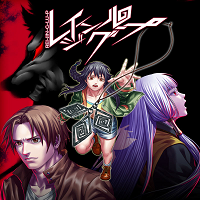
Visual novel that begins with curious smartass Haruaki Fusaishi crashing his bike in the middle of nowhere and being taken in for the night in an equally out of nowhere village by the jaded ex-student hometown returnee Chiemi Serizawa, who offers to help him. After a tour of the strange village on the next day, before Haruaki has a chance to finish bike repairs mist rises from the valley and everyone hurries into a locked space by themselves before the night falls, with Chiemi shoving Haruaki into an outhouse and telling him not to come out before dawn. But Haruaki can not overcome his curiosity and is killed by an actual werewolf...and promptly returned back to life, back before he made the choice leading to his doom, with a "key" that allows him to think of the other choice.
Armed with the knowledge retained from these loops, he along with everyone else in the village is thrust in the middle of a real life game of werewolf/mafia in the closed off space of Yasumizu. Werewolf but when you die in the game you die in real life is a surprisingly great story conceit with the participants taking on the roles of various mafia player archetypes familiar to anyone who has dabbled in the game and the added twists due to the very personal stakes make a lot of sense. Character writing is of a very high level - the ones you would expect to be perceptive and intelligent are consistently so, and you can reasonably sus out each player's role and alignment from how they act. They're also rather enjoyable as people, and the pair of Haruaki and Chiemi in particular is a highlight.
There are a lot of twists, turns and survival choices to make and it's all very exciting in the best kind of page turner way, and there is a very satisfying conclusion to the whole deal. After the scenario you also get access to the revelation mode, which adds each character's secret inner monologue and scenes that are hidden from the player's perspective into the narrative. It's a lot of fun! Raging Loop as a whole is a thrilling and intelligent read.
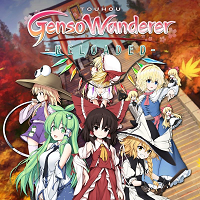
Mystery dungeon is the subgenre of classic roguelikes I am fondest of. With controls that are simple enough to intuitively map on a controller, delve into a procgen turnbased dungeon starting at level 1 and make it through floors crawling with enemies and hidden traps using your initial preparations plus found items on the floor to their maximum capability. Then return to the hub and do it again. It is a formula where many have put their own worthy spins on it, but Touhou Genso Wanderer -Reloaded- is the reigning heavyweight champion.
It is clear from the start that a big design goal of Genso Wanderer was to give the player a robust toolkit to handle problems. In place of the genre standard arrow quiver mechanic that gives the player a limited way to engage threats at range you have P pickups and danmaku, with each character being able to unleash four different danmaku attacks, and yes, there are a lot of playable characters each with their own danmaku/spellcard set and passive characteristics. You can also bring in your choice of a partner character to most dungeons, and these have their own AI routines and skillsets as well. Kitting out your character and partner with a full set of equipment is essential as well, and there are hundreds of different gear that are various sorts of touhou references or other weird stuff and all have their quirks and even resonance effects with each other, and you can further customize them with seals. Aiding you is also a robust set of consumables, with talismans, drinks, character specific spellcards, gaps, even food can have effects beyond the obvious. And once you get access to the alchemy system you can make all this at the hub or even midrun from materials!
With such a powerful array of solutions at the player's disposal, the game needs to deliver a heavy array of threats. And does it ever. Copies of all the characters from modern Touhou canon up to LoLK and some others are here, and almost all of them are here to cause problems. Each enemy class is instantly recognizable to a Touhou fan and has its own flavor-friendly special abilities to make your life difficult in a way that would feel simply unfair in a lesser powered entry of the genre, not to mention the traps lying underfoot. With heavy weaponry and heavy opposition the game becomes a high-powered war, which is exactly the way I find mystery dungeon most interesting. There are a lot of difficult situations but very rarely not a way to neutralize one.
The dungeon scenarios themselves are many and varied. Getting to the first end credits of the game is not a long task, but that is simply the starting point. There is a long main storyline to follow, a large variety of tutorial, side and challenge dungeons, and even side scenarios that take place with a different set of characters and hubs (that you can merge into your main file once you clear them). These come not only with terrain/enemy/trap variety, but also special rule sets such as no carry-in, unidentified items and whatnot. It is difficult to overstate just how much there is in this game should a player really wish to delve into the thick of it.
It is also notable just how well TGWR pays homage to classics of the roguelike genre and Touhou lore itself in how many sensible special interactions there are between various objects and characters in the game. Just about all of it is well documented in the in-game encyclopedia as well, and it's the kind of astounding detail that has come from the team polishing the game in various forms for a decade. The art and music are strong as expected of a big ticket Touhou fangame and the dialogue is amusing, too. Number one in mystery dungeons and Touhou games, Genso Wanderer -Reloaded- is a formidable existence indeed.